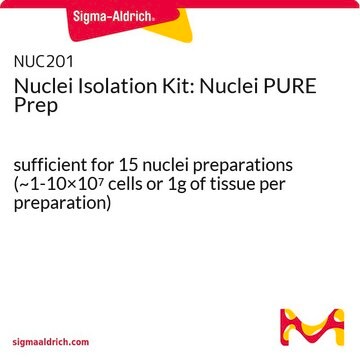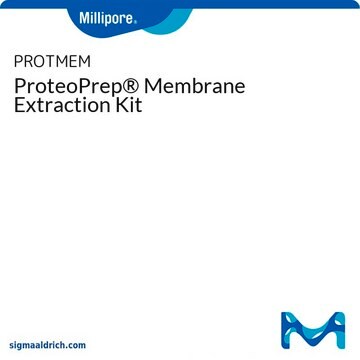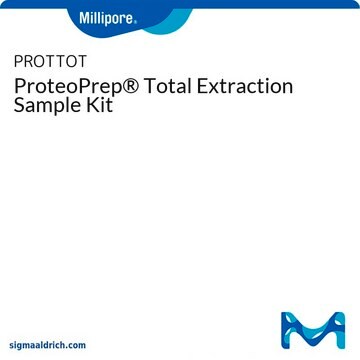2900
Nuclear Extraction Kit
Synonym(s):
Nuclear Isolation Kit
Sign Into View Organizational & Contract Pricing
All Photos(1)
About This Item
UNSPSC Code:
41116012
eCl@ss:
32160405
Recommended Products
manufacturer/tradename
Chemicon®
technique(s)
protein extraction: suitable
application(s)
sample preparation
shipped in
dry ice
Application
CHEMICON′s Nuclear Extraction Kit (Catalog No. 2900) provides a simple and convenient method for the isolation of cytoplasmic and nuclear samples from mammalian cell culture or tissue samples. The Nuclear Extraction Kit can be used in the preparation of purified proteins for use in Western blotting, Electrophoretic Mobility Shift Assays (EMSA), and in CHEMICON′s Transcription Factor Assay product line.
For Research Use Only; Not for use in diagnostic procedures.
For Research Use Only; Not for use in diagnostic procedures.
Research Category
All
All
Components
Cytoplasmic Lysis Buffer, 10x: - (Part No. 90497) One vial containing 10mL of a concentrated lysis buffer. Dilute to a 1x in deionized water.
Nuclear Extraction Buffer: - (Part No. 90498) One vial containing 50mL of a 1x nuclear extraction buffer.
PBS Packets: - (Part No. 60093) Two pouches containing enough dry reagent to prepare 1 liter of a 1x PBS solution per pouch. Dilute packet in deionized water.
DTT, 1M: - (Part No. 90499) One vial containing 100 μL of 1M Dithiothreitol. Prior to use, dilute to a final concentration of 0.5mM (1:2000) in 1x Cytoplasmic Lysis Buffer and 1x Nuclear Extraction Buffer.
Protease Inhibitor Cocktail: - (Part No. 90492) One vial containing 100μL of protease inhibitors in DMSO for use with mammalian cell and tissue extract buffers. A mixture of protease inhibitors with broad specificity for the inhibition of serine, cysteine and aspartic acid proteases and aminopeptidases. Contains 4-(2-aminoethyl)benzenesulfonyl fluoride (AEBSF), pepstatin A, E-64, bestatin, leupeptin, and aprotinin. Contains no metal chelators (e.g. EDTA, EGTA). Prior to use, dilute 1/1000 in 1x Cytoplasmic Lysis Buffer and 1x Nuclear Extraction Buffer.
Detergent, 10%: - (Part No. 90500) One vial containing 3mL of 10% IGEPAL CA-630 (detergent). Cytoplasmic Lysis Buffer and Nuclear Extraction Buffer already contain detergent, however, under certain conditions, more detergent may be required - refer to Extraction Procedure.
Nuclear Extraction Buffer: - (Part No. 90498) One vial containing 50mL of a 1x nuclear extraction buffer.
PBS Packets: - (Part No. 60093) Two pouches containing enough dry reagent to prepare 1 liter of a 1x PBS solution per pouch. Dilute packet in deionized water.
DTT, 1M: - (Part No. 90499) One vial containing 100 μL of 1M Dithiothreitol. Prior to use, dilute to a final concentration of 0.5mM (1:2000) in 1x Cytoplasmic Lysis Buffer and 1x Nuclear Extraction Buffer.
Protease Inhibitor Cocktail: - (Part No. 90492) One vial containing 100μL of protease inhibitors in DMSO for use with mammalian cell and tissue extract buffers. A mixture of protease inhibitors with broad specificity for the inhibition of serine, cysteine and aspartic acid proteases and aminopeptidases. Contains 4-(2-aminoethyl)benzenesulfonyl fluoride (AEBSF), pepstatin A, E-64, bestatin, leupeptin, and aprotinin. Contains no metal chelators (e.g. EDTA, EGTA). Prior to use, dilute 1/1000 in 1x Cytoplasmic Lysis Buffer and 1x Nuclear Extraction Buffer.
Detergent, 10%: - (Part No. 90500) One vial containing 3mL of 10% IGEPAL CA-630 (detergent). Cytoplasmic Lysis Buffer and Nuclear Extraction Buffer already contain detergent, however, under certain conditions, more detergent may be required - refer to Extraction Procedure.
Storage and Stability
The Nuclear Extraction Kit is shipped and stored at -20ºC.
·Cytoplasmic Lysis Buffer (10x), Nuclear Extraction Buffer (1x), 10% Detergent, and the PBS Packets can be stored at 2-8ºC.
·DTT, 1M and Protease Inhibitor Cocktail must be stored at -20ºC. Avoid repeated freeze-thaw cycles.
·Cytoplasmic Lysis Buffer (10x), Nuclear Extraction Buffer (1x), 10% Detergent, and the PBS Packets can be stored at 2-8ºC.
·DTT, 1M and Protease Inhibitor Cocktail must be stored at -20ºC. Avoid repeated freeze-thaw cycles.
Legal Information
CHEMICON is a registered trademark of Merck KGaA, Darmstadt, Germany
Disclaimer
Unless otherwise stated in our catalog or other company documentation accompanying the product(s), our products are intended for research use only and are not to be used for any other purpose, which includes but is not limited to, unauthorized commercial uses, in vitro diagnostic uses, ex vivo or in vivo therapeutic uses or any type of consumption or application to humans or animals.
Signal Word
Danger
Hazard Statements
Precautionary Statements
Hazard Classifications
Aquatic Chronic 3 - Eye Dam. 1 - Skin Irrit. 2
Storage Class Code
10-13 - German Storage Class 10 to 13
WGK
WGK 3
Certificates of Analysis (COA)
Search for Certificates of Analysis (COA) by entering the products Lot/Batch Number. Lot and Batch Numbers can be found on a product’s label following the words ‘Lot’ or ‘Batch’.
Already Own This Product?
Find documentation for the products that you have recently purchased in the Document Library.
Customers Also Viewed
Hong Ma et al.
PloS one, 8(8), e71302-e71302 (2013-08-27)
Diminished Ikaros function has been implicated in the pathogenesis of acute lymphoblastic leukemia (ALL), the most common form of childhood cancer. Therefore, a stringent regulation of Ikaros is of paramount importance for normal lymphocyte ontogeny. Here we provide genetic and
Chenguang Gong et al.
Developmental cell, 34(2), 181-191 (2015-07-07)
Increasing evidence suggests that long non-coding RNAs (LncRNAs) represent a new class of regulators of stem cells. However, the roles of LncRNAs in stem cell maintenance and myogenesis remain largely unexamined. For this study, hundreds of intergenic LncRNAs were identified
Hayeong Kwon et al.
Journal of cellular and molecular medicine, 13(8A), 1549-1564 (2009-09-26)
Mitogenic regulation by caveolin-2 in response to insulin was investigated. Insulin triggered phosphorylation of caveolin-2 on tyrosine 19. Insulin increased the interaction between pY19-caveolin-2 and phospho-ERK, and that interaction was inhibited by a MEK inhibitor U0126. Insulin-induced interaction of caveolin-2
Linli Yao et al.
PloS one, 8(11), e78439-e78439 (2013-11-14)
Neuroinflammation mediated by the activated microglia is suggested to play a pivotal role in the pathogenesis of hypoxic brain injury; however, the underlying mechanism of microglia activation remains unclear. Here, we show that the canonical Notch signaling orchestrates microglia activation
Valerie Bríd O'Leary et al.
Scientific reports, 7(1), 1790-1790 (2017-05-13)
PARTICLE (Gene PARTICL- 'Promoter of MAT2A-Antisense RadiaTion Induced Circulating LncRNA) expression is transiently elevated following low dose irradiation typically encountered in the workplace and from natural sources. This long non-coding RNA recruits epigenetic silencers for cis-acting repression of its neighbouring
Our team of scientists has experience in all areas of research including Life Science, Material Science, Chemical Synthesis, Chromatography, Analytical and many others.
Contact Technical Service
















